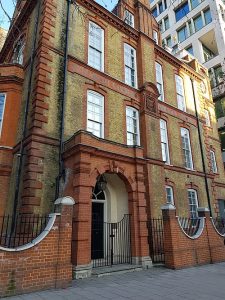The phenomenal woman I highlight here is Elizabeth Garrett Anderson and I also give a nod to the phenomenal feminists of the 1970’s who helped preserve Elizabeth’s legacy.
Elizabeth Garrett was born in 1836 in Whitechapel. When she was 5, her father moved the family back to his native Suffolk and as there were no schools locally, she received little formal education until she was 13, when her father had made enough money to send Elizabeth and her sister to boarding school in London.
After leaving school, Elizabeth continued to read widely, study Latin and Maths, and take a keen interest in politics.
She was determined to become a doctor, but as women were barred from the profession, she initially trained to be a nurse and paid for extra lessons in anatomy, physiology and pharmacology. Despite this, her applications to several medical schools in England and Scotland were all rejected. Undeterred, Elizabeth discovered a route through the Society of Apothecaries and on passing their exams in 1865, she obtained a licence to practise medicine.
She set up a free treatment dispensary for women and was made visiting physician at the East London Hospital, but her qualification was still considered inferior to a medical degree. Discovering the Medical School at the Sorbonne in Paris would admit women, Elizabeth taught herself French, enrolled on their course and completed it successfully in 1870, although the British Medical Register still refused to recognise her qualification.
 Nonetheless, she founded the ‘New Hospital for Women’ and staffed it entirely with women. More women were demanding the right to become doctors, so Elizabeth established the ‘London School of Medicine for Women’ to train them. In 1876, the BMR was forced by act of parliament, to admit women to the medical profession.
Nonetheless, she founded the ‘New Hospital for Women’ and staffed it entirely with women. More women were demanding the right to become doctors, so Elizabeth established the ‘London School of Medicine for Women’ to train them. In 1876, the BMR was forced by act of parliament, to admit women to the medical profession.
Elizabeth was also active in the Suffrage Movement, organising petitions and marches, taking part in raids on the House of Commons and speaking on a lecture tour with Annie Kenny. When she retired from medicine and moved back to Suffolk, Elizabeth remained politically active and was elected mayor, the first female in Britain to hold that office. Other ‘firsts’ included: becoming the first female Dean of a British Medical School and the first woman to sit on the London School Board.
Elizabeth died in 1917 and the hospital she founded was renamed the Elizabeth Garrett Anderson in her honour. It continued to function as a women only hospital in its Victorian premises on Euston Road.
However, in the 1970’s, Camden Health Authority decided the hospital wasn’t viable. It was ‘too small’, ‘too old’ – ‘women only’ was divisive and anyway, big was better!
Nurses were no longer allowed to train at the Elizabeth Garrett and the premises were left to deteriorate; for example, the lift broke down and wasn’t repaired, which meant operations couldn’t be performed as the upper floors weren’t accessible.
In 1976, Barbara Castle, Minister of State for Health and Social Security in the Labour government, signed the closure order. This sparked an outcry from numerous women’s organisations across the land, and from many high profile female commentators and politicians, including the leader of HM’s Opposition, and several male peers in the House of Lords. Debates took place in parliament and angry petitions were signed.
Staff, fearful that patients or equipment would suddenly be moved to other hospitals, occupied the building and festooned it with defiant flags. Outside, hundreds of women, including myself, mounted regular noisy protests, waving our homemade banners and singing revolutionary songs. The battle raged for 3 years, but in 1979, an unimaginable first: Britain’s first female prime minister reversed the closure, reinstated funding and Elizabeth’s feminist flagship thrived for another 20 years, before finally being subsumed into University College Hospital.
The building near Euston station remains though, still bearing its founder’s name, and is now the HQ of the UK’s largest trade union, Unison, which represents 1.3 million public service workers.
Barbara Lawton
